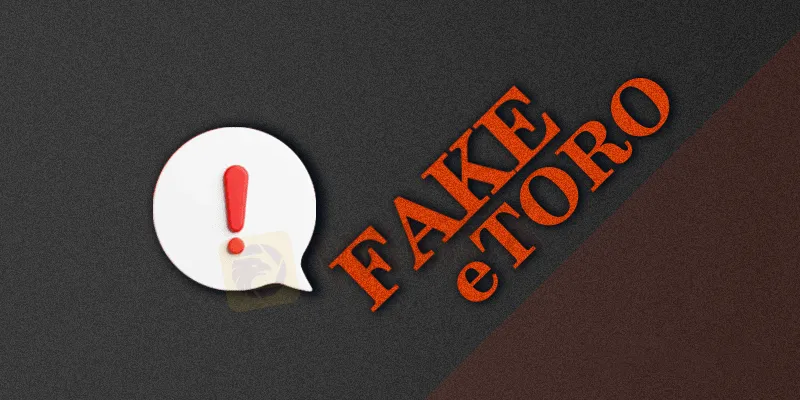简体中文
繁體中文
English
Pусский
日本語
ภาษาไทย
Tiếng Việt
Bahasa Indonesia
Español
हिन्दी
Filippiiniläinen
Français
Deutsch
Português
Türkçe
한국어
العربية
FAKE eToro! Not Seeing the Account but Making a Profit, an Investor was Asked to Pay Withdrawl Fee
Abstract:If someone tells you that he/she can open an account and make money for you, and the only thing you need to do is the deposit, will you believe him/her?

Recently, a Malaysian investor encountered such a situation, the victim thought an operator opened an account for her in eToro and made money, but never thought that the platform she ran into was fake!
The investor were told to pay withdrawal fees without seeing her accounts
The victim claims that she initially met someone online who claimed to be from eToro and was invited into a WhatsApp group chat. Seeing that other people in the group were making a lot of money from their investments, she was also tempted and eventually decided to join the “investment plan”. But the company only provides “package plan”. In this package, the user does not need to worry about anything except the deposit. After remittance, the company will not only open an account and trade on behalf of the client but also guarantee the profit. The customer saw that the website they sent was indeed the official website of eToro, and the platform was indeed authorized by the relevant regulators, so the broker did not become suspicious.

After some time, the other party said that the victim's account had earned money and could be withdrawn, but she had to pay a withdrawal fee first. She was confused by all this because the victim had not seen her trading account and the company never provided any details of the transaction, yet she was asked to transfer money again. Confused, she asked to cancel the transactions, but the scammer simply ignored her request and later claimed that the victim had very little money left in her account and urged her to make a margin call.

By this time, the victim had already confirmed that she had been scammed and refused the request. Furthermore, she discovered that she did not actually have an account with the real eToro! The platform on which the scammers opened the account for her was actually a fake eToro.

WikiFX reminds you
Recently WikiFX has been receiving an increasing number of complaints, and based on the descriptions of the victims, these scams are different from the usual Forex scams.
Previously, unregulated brokers would ask their clients to trade on their own, but recently these scams have been prepared directly for the victims with a “package”. The victims are apparently only required to deposit money and do nothing else to make a lot of money; in fact, such a “good thing” does not exist. The scammers only claim to have made huge profits for their clients, and then ask them for an expensive withdrawal fee. The scammer receives the money and then slips away.

Disclaimer:
The views in this article only represent the author's personal views, and do not constitute investment advice on this platform. This platform does not guarantee the accuracy, completeness and timeliness of the information in the article, and will not be liable for any loss caused by the use of or reliance on the information in the article.
Read more

CySEC Revokes UFX Broker Licence as Reliantco Halts Global Operations
The Cyprus Securities and Exchange Commission (CySEC) has officially withdrawn the Cyprus Investment Firm (CIF) licence of Reliantco Investment Limited, the operator of UFX.com. This decision followed a six-month period during which the company failed to provide any investment services or perform investment activities.

Elon Musk Sparks Debate Over Presidential Power and Federal Reserve Independence
Elon Musk has voiced his support for the controversial idea that United States presidents should have a role in shaping Federal Reserve policies. This endorsement aligns with recent remarks from President-elect Donald Trump, who has hinted at revisiting the central bank's independence, a long-held tradition in the nation's financial governance.

Consob Sounds Alarm: WhatsApp & Telegram Users Vulnerable to Investment Scams
Italy's financial regulator, Consob, has raised alarms over an increase in fraudulent schemes targeting investors through mobile messaging platforms such as WhatsApp and Telegram.

Crypto 101: Coins vs Tokens
For those new to the world of cryptocurrency, terms like "coin" and "token" may seem interchangeable. However, understanding the distinction between these two digital assets is crucial for navigating the crypto landscape. Both coins and tokens serve as integral components of blockchain ecosystems, yet they differ in their functionalities, use cases, and the technologies underpinning them.
WikiFX Broker
Latest News
Tokyo Police Arrest 4 for Unregistered FX Trading Scheme
BSP Shuts Down Uno Forex Over Serious AML Violations
ACY Securities Expands Global Footprint with South Africa Acquisition
Rupee gains against Euro
WikiEXPO Global Expert Interview: The Future of Financial Regulation and Compliance
DFSA Warns of Fake Loan Approval Scam Using Its Logo
Consob Sounds Alarm: WhatsApp & Telegram Users Vulnerable to Investment Scams
CySEC Revokes UFX Broker Licence as Reliantco Halts Global Operations
Bitcoin ETF Options Get Closer to Reality with CFTC Clarification
Peso Depreciation to 59:$1 Likely Amid Strong Dollar Surge
Currency Calculator


